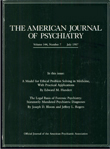Cognitive Behavior Therapy for Weight Gain
To the Editor: Some evidence has suggested that atypical antipsychotics offer a more comprehensive treatment for schizophrenia than typical antipsychotics. However, these drugs often lead to considerable weight gain (1, 2), resulting in poor compliance and a greater risk of cardiovascular morbidity and mortality. To our knowledge, effective treatments of this side effect have not been identified. Here we report on the successful treatment of weight gain due to atypical antipsychotics with an approach that included elements of behavior therapy and counseling.
Six patients with chronic schizophrenia and a patient with bipolar disorder were referred to a treatment group for medication-associated weight gain. Three additional schizophrenic patients signed up for individual treatment. In both group and individual sessions, a therapist trained as a psychologist and a dietician provided a treatment that included detailed counseling and a cognitive behavior approach. Treatment sessions focused on causes of weight gain, healthy low-calorie nutrition, specific recommendations for weight loss, and instructions about physical exercise and relaxation. In addition, problems with weight reduction were discussed, and behavioral and cognitive remedies were explored. Individual treatment spanned seven to nine sessions; in the group setting, 10 biweekly sessions focused on weight reduction, followed by six sessions focusing on weight maintenance.
We evaluated the outcome of the treatment with a retrospective analysis of the weight data recorded in the charts of the patients and the notes of the dietician. Three patients dropped out of group treatment within two sessions. No data were recorded for these patients. For one patient who completed treatment, no data were available retrospectively. Thus, data were analyzed for six patients, all with a diagnosis of schizophrenia (two men and four women; age: mean=37.3 years, SD=14.7). Four patients were treated with clozapine (dose range: 25–250 mg/day) and two with 10 mg/day of olanzapine. Before treatment the mean body mass index was 29.6 kg/m2 (SD=2.5, range=26.6–34.0). After treatment, the body mass indexes ranged from 22.28 to 30.12 kg/m2 with a mean of 25.1 (SD=3.0); the difference between pre-and posttreatment was significant according to a paired t test (t=3.97, df=5, p<0.02). Actual weight loss ranged from 0 to 21 kg. Five of these six patients showed a posttreatment body mass index of less than 25 kg/m2, the upper limit of the recommended range.
Our results suggest that cognitive behavior treatment may be a successful approach to control of an important side effect of atypical antipsychotics. Prospective controlled trials should be conducted to confirm these encouraging results.
1. Allison DB, Mentore JL, Heo M, Chandler LP, Cappelleri JC, Infante MC, Weiden PJ: Antipsychotic-induced weight gain: a comprehensive research synthesis. Am J Psychiatry 1999; 156:1686–1696Google Scholar
2. Wirshing DA, Wirshing WC, Kysar L, Berisford MA, Goldstein D, Pashdag J, Mintz J, Marder SR: Novel antipsychotics: comparison of weight gain liabilities. J Clin Psychiatry 1999; 60:358–363Crossref, Medline, Google Scholar



